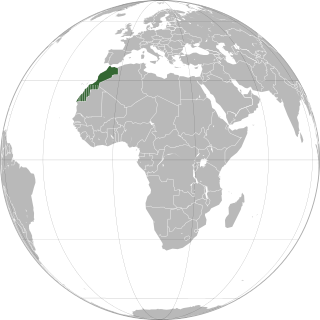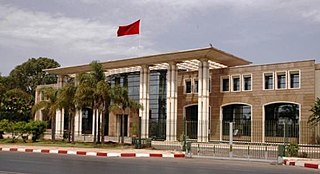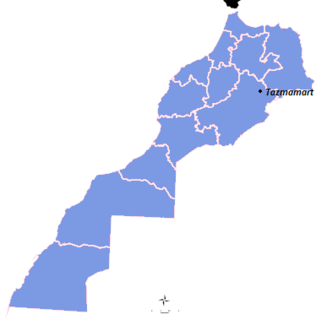 W
WBayʿah, in Islamic terminology, is an oath of allegiance to a leader. It is known to have been practiced by the Islamic prophet Muhammad. Bayʿah is sometimes taken under a written pact given on behalf of the subjects by leading members of the tribe with the understanding that as long as the leader abides by certain requirements towards his people, they are to maintain their allegiance to him. Bayʿah is still practiced in countries such as Saudi Arabia and Sudan. In Morocco, bayʿah is one of the foundations of the monarchy.
 W
WThe occurrence of petty and grand corruption in public and private sectors in Morocco are one of the socio-political challenges the country is facing. A leaked report by a US diplomat stated that corruption had become much more institutionalized under King Mohammed VI, and that the royal family had been using public institutions to coerce and solicit bribes.
 W
WThe Israel–Morocco normalization agreement is an agreement announced by the United States government on December 10, 2020, in which Israel and Morocco agreed to begin normalizing relations. On December 22, 2020, a joint declaration was signed pledging to quickly begin direct flights, promote economic cooperation, reopen liaison offices and move toward "full diplomatic, peaceful and friendly relations." Morocco officially recognized Israel in its communication to Israeli Prime Minister Benjamin Netanyahu.
 W
WLesbian, gay, bisexual, and transgender (LGBT) people in Morocco face legal challenges. Both male and female same-sex sexual activity is illegal in Morocco. Moroccans of the LGBTQ community face a lot of hardships in the country with limited legal rights.
 W
WAhmed Marzouki is a former military Moroccan officer who was forcibly disappeared after the failed coup attempt of 1971.
 W
WMechouar or meshwar is a type of location, typically a courtyard within a palace or a public square at the entrance of a palace, in the Maghreb or in historic al-Andalus. It can serve various functions such as a place of assembly or consultation, an administrative area where the government's affairs are managed. It was the place where the sultan historically held audiences, receptions and ceremonies. The name is sometimes also given to a larger area encompassesing the palace, such as the citadel or royal district of a city.
 W
WThe Ministry of Foreign Affairs, African Cooperation and Moroccan Expatriates is the foreign affairs ministry of Morocco, responsible for implementing Morocco's foreign policy and ensuring relations with foreign states.
 W
WMoroccan nationality law is the subject of the Moroccan Dahir (decree) of September 6, 1958, official Bulletin Number 2394. In general, Moroccan nationality is transmitted by filiation or birth in Morocco. However, it gives the right to Moroccan males to transmit citizenship to their children and foreign wives, and since the last update, that is possible for women. The aim of the update was to follow Morocco's recent human rights reforms, most notably the Moroccan family code called, Mudawana, which aimed to fight gender inequality. It has been done after much debate in the media.
 W
WThe Moroccan Western Sahara Wall or Berm is an approximately 2,700 km (1,700 mi) long structure, mostly a sand wall, running through Western Sahara and the southwestern portion of Morocco. It separates the Moroccan areas on the west from the Polisario-controlled areas on the east.
 W
WThe 2007 Morocco–Spain diplomatic conflict was a short-lived disturbance of international relations between Morocco and Spain that arose after the announcement of the impending visit of the King of Spain to the Spanish-ruled autonomous cities Ceuta and Melilla, which are claimed by Morocco.
 W
WGeneral Mohammad Oufkir was a senior military Moroccan officer who held many important governmental posts. It is believed that he was assassinated for his alleged role in the failed 1972 Moroccan coup attempt.
 W
WThe Parliament of Morocco is the bicameral legislature located in Rabat, the capital of Morocco.
 W
WThe prime minister of Morocco is the head of government of the Kingdom of Morocco and serves in a position akin to a prime minister in other constitutional monarchies. The prime minister is chosen by the king of Morocco from the largest party elected to parliament. The Constitution of Morocco grants executive powers to the government and allows the head of government to propose and dismiss cabinet members, provincial governors, and ambassadors, to oversee government programs and the delivery of public services, and to dissolve the lower house of parliament with the king's approval.
 W
WThe Royal Advisory Council for Saharan Affairs is an advisory committee to the Moroccan government on the Western Sahara. It was devised by King of Morocco, Hassan II in the 1970s, but allowed to lapse. It was re-established by his son, Mohammed VI in early 2006, after a new autonomy plan was devised to replace the United Nations' Baker Plan. The autonomy plan is opposed by the Polisario Front, which demands that the United Nations resolutions calling for a referendum be implemented.
 W
WTazmamart was a secret prison in the Atlas Mountains of Morocco, holding political prisoners. The prison became a symbol of oppression in the political history of contemporary Morocco. It is located near the city of Er-Rich, between Errachida and Midelt. It was managed by commandant Feddoul and Hamidou Laanigri, both Royal Moroccan Gendarmerie officials.
 W
WWestern Sahara, formerly the Spanish colony of Spanish Sahara, is a disputed territory claimed by both the Kingdom of Morocco and the Popular Front for the Liberation of the Saguia el Hamra and Rio de Oro, which is an independence movement based in Algeria. It is listed by the United Nations (UN) as a non-decolonized territory and is thus included in the United Nations list of Non-Self-Governing Territories.
 W
WThe Western Sahara Autonomy Proposal is an initiative proposed by Morocco in 2006 as a possible solution to the Western Sahara conflict. In 2006, the Moroccan Royal Advisory Council for Saharan Affairs (CORCAS) proposed a plan for the autonomy of Western Sahara and made visits to a number of countries to explain the proposal. The Spanish approach to regional autonomy has been named as a possible model for Western Saharan autonomy, mentioning specifically the cases of the Canary Islands, the Basque Country, Andalusia or Catalonia. The plan was presented to the UN Security Council in April 2007 and received the backing of the United States and France. This initiative constituted the main ground for the Moroccan proposal at Manhasset negotiations.